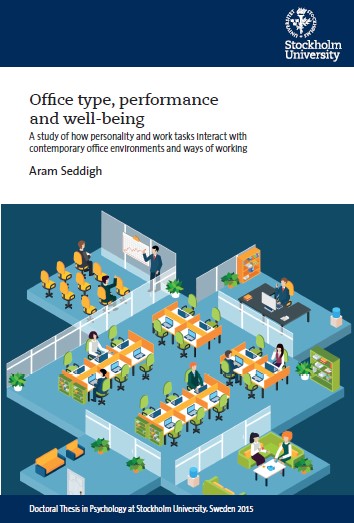
Office type, performance and well-being
Dr. Seddigh defended his doctoral thesis in 2015 with the title Office type, performance and well-being. A study of how personality and work tasks interact with contemporary office environments and ways of working”. Below you will find the abstract, summary of each study and a link for download.
Please download the thesis here.

Dr. Seddigh is lic. psychologist, economist and has a PhD in work and organizational psychology. Today he is the CEO of WeOffice and a workplace strategist.
Abstract
Today, many organisations are adopting offices that have an open design with or without flexible seating. While advocates of open-plan offices propose that these office types lead to cost savings and aid inter and intra-team communication, opponents argue that these office types are associated with decreased performance and worsened health among employees. This thesis investigates how the type of office (cell offices, shared room offices, small open-plan offices, medium-sized open plan offices, large open-plan offices and flex offices) influences employee health and performance, and whether this is different for different personalities and jobs with different concentration demands. Data were gathered by means of surveys and cognitive tests from five organisations with different office types
Study I
In Study I (N=1241), the aim was to investigate the main effect of office type on indicators of health and performance and the interaction effect of office type with the need to concentrate in order to carry out work tasks. Office type alone was associated with distraction and cognitive stress in such a way that cell offices were associated with fewest problems, followed by flex offices, while open-plan offices were associated with most problems. While employees in open-plan offices and employees in flex offices reported more problems as the need for concentration increased, employees in cell offices reported the same level of problems regardless of the need of concentration.
Study II
Study II (N=527) investigated how performance on a memory test was affected during normal working conditions as compared to a quiet baseline. There was a negative dose-response relationship between the size of the open-plan office environment and the drop in word recall during the normal working condition. However, Study II also showed that individuals working in cell offices had as high a drop in performance during normal working conditions as did those working in large open-plan office environments.
Study III
Study III (N=1133–1171) focused on the interaction effect between office type and personality. The personality trait agreeableness interacted with office type on the outcome variables distraction and job satisfaction. Specifically, Study III may indicate that as offices get more open and flexible, agreeable people will report more problems. In conclusion, the studies in the present thesis have implications for practice and suggest that office type impacts on employee health and performance, while concentration demands of the job and agreeableness moderate the effects. Although employees report higher level of distraction in open-plan office environments, when performance on a demanding task is measured, cell offices are not as favourable during normal working conditions as self-reported data usually indicate. Organisations should also be aware that, among open-plan offices, small open-plan offices are associated with fewer problems.
Keywords: Office type, open-plan office, flex office, cell office, performance, job satisfaction, distraction, self-rated health, well-being, cognitive stress, exhaustion, individual differences, personality, concentration, stimulus screening ability, memory.
Please download the thesis here.

Contact Us
Leave a Request and we'll contact you shortlyAlways be updated
Keep yourself updated by receiving our newsletter
 Connect with us
Connect with us
